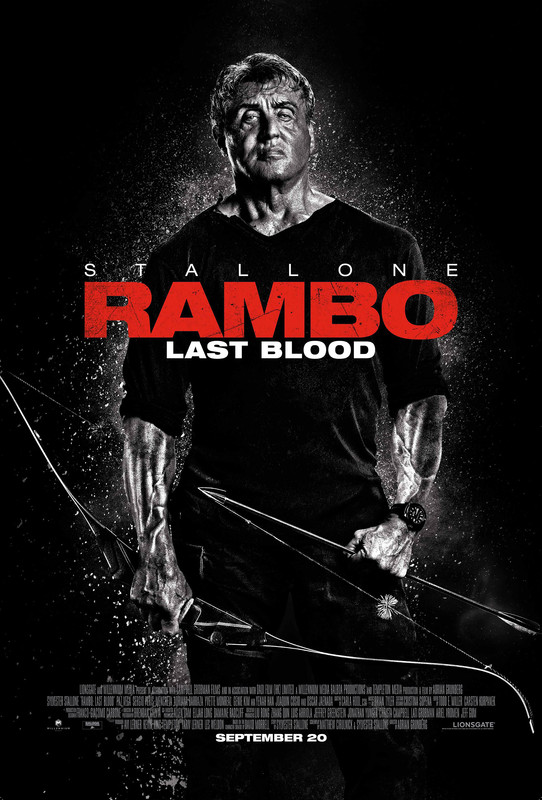Dir: Adrian Grunberg
There has always been more to Sylvester Stallone than his meathead image. Many of his performances are better and more nuanced than he’s ever been given credit for and he has written and directed much of his own work. This strong authorial voice behind the scenes has almost certainly been a large part of how he has managed to sustain not one but two career-defining franchises over a period of around 40 years. The Rocky series may be patchy, but it has only grown more interesting with each entry, drawing together into a sort of alternative autobiography as each entry reflects on Stallone’s career and life.
Rambo was never really meant to be a franchise. In the novel the first entry in the series, 1982’s First Blood, was based on, Rambo died at the end. It probably should have stayed that way in the film, because with each entry the ensuing series has drifted further from that film's downbeat tone. The John Rambo of First Blood is painted not as a hero but as a traumatised Vietnam veteran whose PTSD makes him click into survival mode when a small-town sheriff decides to victimise him. He kills no one on purpose and the film’s crescendo is not violent but emotional. Rambo: First Blood Part II, Rambo III and the incongruously titled Rambo increasingly dumped any form of introspection in favour of escalating violence. That pattern continues with Rambo: Last Blood.
Last Blood finds Rambo living on a ranch raising horses. He lives with a Mexican housekeeper (Adriana Barraza) and they seem to have been raising Gabrielle (Yvette Monreal) together, though whether she’s actually related to Barrraza’s character is never addressed. With the help of a friend, Gabrielle has found her long absent father and she wants to visit him in Mexico and ask why he abandoned her. In Mexico, Gabrielle is kidnapped by a trafficking gang and hooked on drugs, leading an enraged Rambo to go hunting for her and for vengeance.
Any way you slice it, Last Blood is a bad film. Before we even get to its deeper-seated issues, the screenplay is terrible. The characters are ciphers, particularly Paz Vega’s crusading journalist, who does little in her ten minutes of screen time but point Rambo in the right direction. It recalls another godawful fifth entry in an action franchise: A Good Day to Die Hard. That film, like this one, dumped much of what defined its leading character. The sequels may have progressively pulled back on Rambo’s PTSD, but even Stallone’s 2008 entry found a little space to allow the character and the audience to reflect on how the years of war had shaped him. This film has no such inclination, instead, it’s just a bit of weak setup building to a group of totally personality free bodies being mashed by Rambo in a Home Alone style third act. There are rumours that Stallone ghost directed the second film, but so far it is only the fourth that he has been the credited director on, not that you’d be able to tell from Adrian Grunberg’s anonymous work here. The director delivers the violence fairly competently, but this isn’t an interesting or memorable looking film in any way.
The Rambo series was never the model of political correctness, and I’m not suggesting it needs to start being that now, but by any standard, this is a disturbing and nasty film in the political context of 2019. Of course, trafficking gangs exist, and are bad, but Stallone and Matthew Cirulnick's screenplay doesn’t even attempt nuance. It’s not just the gang either, every person we encounter in Mexico, with the exception of Vega, who does nothing, is an unambiguous and unexplored villain. Of course Rambo has to have a motivating factor, but Gabrielle is never more than a prop, the same is true of Adriana Barazza’s Maria. It sometimes feels as though the film is using these characters as a get out of jail card for its otherwise racist violence—Rambo likes THESE Mexicans, so he can’t be racist. It’s not convincing. The whole film feels like a Trump voter’s wet dream of the solution to the border ‘crisis’, and a shot of the wall, just before the orgy of ultraviolence that forms the film’s last 20 minutes, only underlines this point.
I’d like to brush off the film’s politics, to say just enjoy it as unserious and vicarious splatter, as we do many horror films. The problem with that is that Rambo has always been political and in 2019, with this particular plot as the driving force, the politics are inescapable. If there had been a measure of thoughtfulness, of nuance, of self analysis or criticism, the politics could have been a genuinely interesting reflection on how Rambo ended up this way. Those things aren't there, so it's just vile. In a way, I hope Last Blood isn’t the end for Rambo because, whatever my issues with the character and the series, an iconic figure like this deserves a better send off. On the other hand, I won’t mourn if he disappears into the desert, like a lot of other dinosaurs before him.
½★


No comments:
Post a Comment